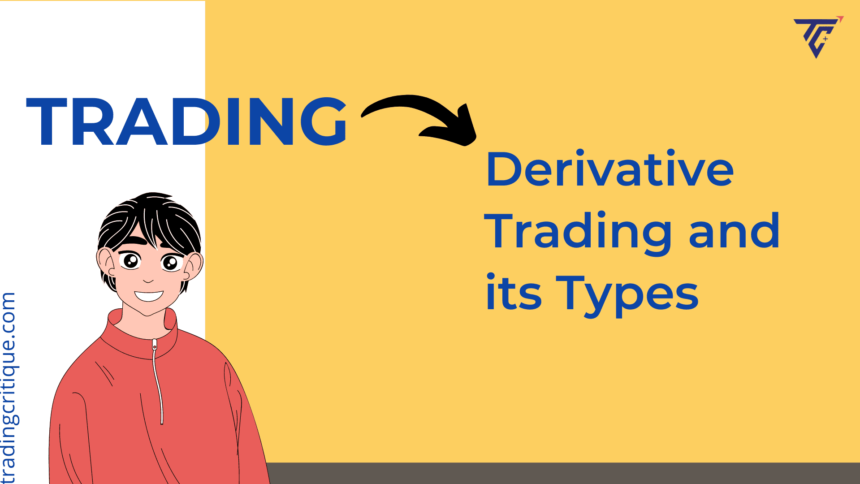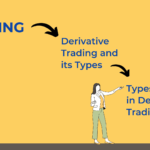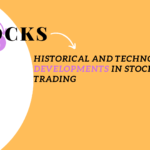Derivative trading is a type of financial trading which plays a major role nowadays. In this article, tradingcritique.com explains you about Derivative trading and its types along with the different derivative contracts associated with it, which can be easily understood.
Derivatives trading
Derivatives trading is traded using derivative contracts which derives its value from the underlying financial asset. This financial asset can be a stock, bond, commodity, forex currency pair, market index, interest pair, etc. The price movements of the financial asset are considered in the derivative contracts.
Contracts are made only on the elements such as the price movements of the financial asset and it is not required to own the financial asset. Sometimes the person holding the financial asset will also involve in Derivative trading to hedge the risks involved in holding that asset. Derivatives trading became popular with commodity trading where the buyers and sellers used to lock their future prices beforehand.
Derivatives trading is mostly preferred by traders as they cost less than normal trading and it is more feasible. This type of trading is popular in Over-The-Counter platforms.
Types of Derivatives trading
Derivatives trading are broadly classified according to where the Derivatives trading takes place such as the Exchange-Traded Derivatives trading and Over-The-Counter Derivatives trading.
Exchange-Traded Derivatives trading
When the Derivatives trading takes place in regulated exchanges which are highly centralized with regulations it is called Exchange-Traded Derivatives trading. It does not have any counterparty risks as all the transactions are recorded and monitored by the clearing houses. Two main types of Derivative contracts that are traded in Exchanges are Futures and Options. Exchange-traded derivatives are available in all kinds of exchanges such as the Stock exchange, Commodity exchange, etc.
Futures
Futures are contracts which are made either to buy and sell the financial instrument at the specified price for a future date. So, the price fluctuations of that financial instrument over time does not affect this Future deal of trade. Futures are traded in exchanges, are more safe and secure as it is regulated via clearing houses. Major exchanges that provide Futures for derivative trading are London international financial futures and options exchange (LIFFE) in London and the Chicago Mercantile Exchange (CME) in the USA. Some broker platforms which provide Futures derivative trading are Charles Schwab, TD Ameritrade, Saxo Capital, Interactive brokers, etc.
Options
An option is a type of derivative contract which allows the trader the right to, but not the obligation either to buy or sell an underlying financial asset, at a specific strike price at a specific date. Put and Call of the two famous terms related to options.
If you Buy a Derivative Contract it is called Call.
If you Sell a Derivative Contract, it is called Put.
The options traded in the exchanges are recorded and settled through Options Clearing Corporation which makes them more regulated and reduces the counterparty risks. Some examples of Exchange-Traded Options are Stock options, Index options and Bond options.
Over-The-Counter Derivatives trading
Over-The-Counter (OTC) derivatives trading happens outside the Centralized Exchanges. OTC Derivatives trade happens Bilaterally, and it is Decentralized with fewer regulations. Counterparty risks are high as there is no clearing house associated with OTC derivatives trading. Two major types of OTC derivative contracts are Forward and Options, other types are Contract For Difference (CFD), Swaps, etc.
Forwards
Forwards are same as the futures contract that happens in private trade dealings and Over-The-Counter trade. It has counterparty risks involved as they are traded bilaterally.
Options
Same as the Exchange-Traded options Call and Put options are also exercised in the Over-The-Counter derivatives trading. There are other different types of OTC options available such as the Exotic options, Spread Betting, Swap options/Swaptions. There are many types of Exotic options available such as Barrier options, Binary options, Chooser option, Component options, and Lookback option. Some famous brokers which provide Options trading are Robinhood, E*Trade, Fineco, TradeStation, etc.
Contract For Difference (CFD)
The Contract for difference is a contract made on financial derivatives in which the traders exchange the difference in asset price while opening or closing a trade.
A Contract for difference considers the price movements of the underlying financial asset. You buy a CFD when you guess or speculate that the price of the underlying asset will increase, and you sell it when you speculate that the price will go down. The price difference either gives you profit or loss. The difference in CFD is the difference in the price of the underlying asset in which you execute the trade.
The features of Contract for difference are,
- When you profit, your CFD provider pays the difference in the asset price while buying and selling the underlying asset.
- If you have a loss, then you need to pay the CFD provider the difference in asset price.
- Asset price is considered when stock is the underlying asset, whereas the difference in Spread is paid when Currencies, indexes, Commodities, and other Financial instruments are the underlying asset.
The main difference between the Options and CFD is the Expiry date. Options have an expiry date but CFD does not have an expiry date. CFD is banned for U.S. citizens. Some best brokers that provide Contract-For-Difference are XM, IG, and eToro.
Swaps
Swaps are derivative contracts where the exchange of cash flows or liabilities or financial obligations take place between the two different financial institutions of the holders/parties of the contract. The best example for swaps would be the interest rate swaps.
Retail investors and traders do not generally engage in swaps and it is most prominent between companies, corporations, businesses, and financial institutions such as the banks. Swaps are well customized to fulfil the specific needs of these institutions.
Some other examples of swaps are currency swaps, commodities swaps, debt-equities swaps, total return swaps and credit default swaps.
These Derivatives trading types and their respective derivative contracts involved are major ones available in various Exchanges and Trading platforms. Many new forms of Derivatives trading are created day by day and getting popularity.
In a Nutshell
- Derivatives trading is done using derivative contracts which derive its value from the underlying financial asset.
- Derivatives trading can be broadly classified into Exchange-Traded Derivatives trading and Over-The-Counter Derivatives trading.
- Types of Exchange-Traded Derivative contracts are Futures and Options.
- Types of Over-The-Counter Derivatives contracts are Forwards, Options, CFD, Swaps, etc.







